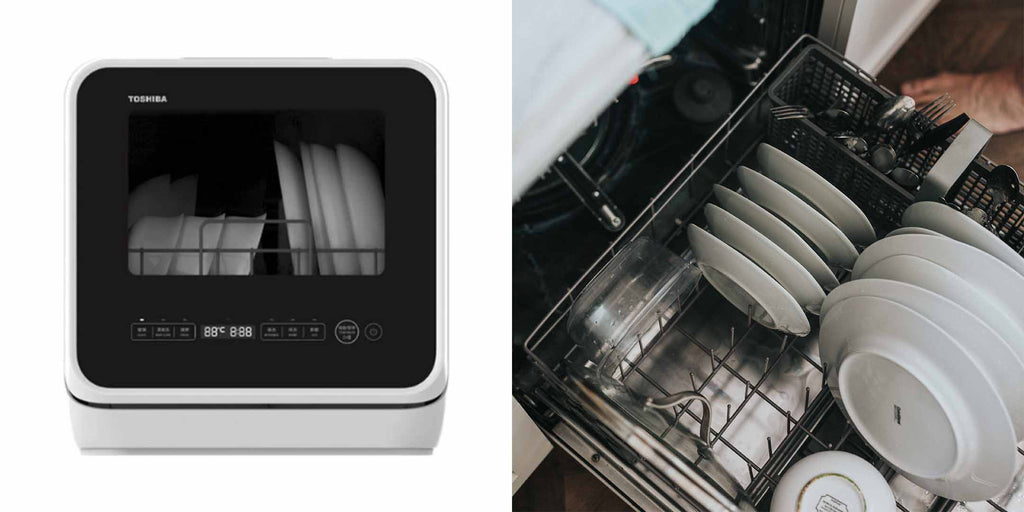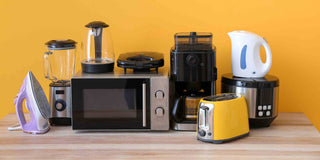Ever wonder which of your kitchen appliances are the culprits for your towering bills?
It's the most nerve-wracking to wait for your electricity bill, especially when the weather gets scorching in Singapore. You may be aware that most cooling appliances take up a large amount of power consumption, but there are some appliances in your kitchen that consume a significant amount of energy.
To spot where your hefty bill is coming from and help you cut your expenses, here is the list of the kitchen appliances that take the most electricity and some ways to properly use them and save energy.
Refrigerator

Your refrigerator, the biggest and one of the most common appliances present in every kitchen, provides multiple functions and benefits for your home. Aside from being known for its uses, this major appliance is notorious when it comes to its power consumption.
Your refrigerator operates 24/7 to keep your food cool and preserve shelf life. This means that your refrigerator consumes energy all the time. Unfortunately, unlike other appliances you can use less often, you cannot turn off your refrigerator to save energy. It's a good thing appliance manufacturers make more energy-efficient refrigerator units available on the market.
Always read through the NEA Tick label to check the refrigerator's energy efficiency.
To regulate your energy consumption, make sure that your refrigerator works at the right temperature. Having a lower temperature does not mean that your refrigerator is doing its work well. In fact, when the temperature is lower than needed, your food will spoil or undergo frost damage. On the other hand, when your refrigerator is exposed to excessive heat, it will need to work extra hard, consuming more energy. To avoid this, place your refrigerator away from your window, where it receives direct sunlight. As much as possible, maintain a decent distance between your refrigerator and other heat-producing appliances like your oven or hob. Remember to keep the refrigerator at a temperature of at least 40ºf.
Electric Hob and Oven

Aside from cooling appliances, heating appliances also consume a big amount of energy in your kitchen. When often used at a higher temperature, these appliances significantly increase your energy consumption. This is more evident to those who love to cook and bake. The good thing is, unlike your refrigerator, the use of your oven or electric hob can be regulated.
To conserve energy, make sure that your appliances do not work extra hard. Instead of heating food batch by batch in your oven, try using an oven rack to heat more food batches at the same time. Practice turning off the heat earlier and making use of the residual heat in your oven to continue warming your food. Use ceramic pans that absorb and retain heat better than metallic cookware. Proper planning of your appliance usage will help you conserve energy.
Another great option is to invest in an induction hob that focuses the heat directly on your pans through magnetic coils instead of wasting energy heating other surfaces. A convection oven is also a reliable appliance in terms of energy savings since it blows and circulates warm air throughout the interior, making it quicker to heat your food.
Dishwasher

Oh no. As much as possible, we don't want to face all those dirty cookware, plates, and silverware at once. During busy days like occasions, a handy dishwasher takes a lot of dishwashing work off your plate. Although it does not consume as much energy as other appliances, a dishwasher uses a lot of water.
To conserve water while using this time-saving appliance, only run your dishwasher in a full-load programme when you have so many dishes to work on. This is to wash more items at once while lessening your water consumption. For small families, it is good to buy a more compact dishwasher to only focus on what your family needs.
If you find the right strategy for using your dishwasher, you will save more water than washing your plates and silverware by hand without a basin. Using a dishwasher can also save you so much time and effort, as it takes 15 minutes to finish the process of automatic dishwashing. With its proper water temperature, using plates cleaned through a dishwasher is safer than using items that are cleaned using dishwashing liquid and a sponge.
How to Conserve Energy in Your Kitchen

- Choose energy-efficient appliances. Whether it is your major kitchen appliances or the medium-sized to smaller kitchen gadgets, it is important to take note of your possible energy consumption based on how often you will use them. Energy-efficient appliances are relatively more costly than standard varieties. However, these appliances will help you save more money in the long run.
- Make sure that your appliances are the right size. Big is not always the best, even for appliances. Your oven, dishwasher, and even refrigerator work harder as they get bigger. It means that they require more energy than the more compact units. If you only intend to use your refrigerator for your frozen goods, go for a chest freezer instead. On the other hand, smaller appliances are inefficient for larger families since you will need to use them more often.
- Unplug appliances when not in use. After using your appliance, it is easy to wipe it clean and leave. Although your refrigerator needs to be plugged in 24/7, other appliances, like your oven, rice cooker, and dishwasher, may rest when not in use.
- Keep your refrigerator's door closed as much as possible. Heat makes your refrigerator work harder. When you often open and close your refrigerator's door, the temperature becomes inconsistent, making it harder to achieve the required temperature.
- Use copper pans for your induction hob. A simple yet effective way to conserve energy is to use copper pans when cooking. Copper conducts energy very well, meaning it will take less time to heat and your food to cook. Also, to make sure that heat is transferred smoothly, choose flat-surfaced cookware for your induction hob.
Appliances are essential to making our daily lives better, especially in our busy kitchens. Having these appliances in your kitchen should be a breeze, not something to be afraid of. Practicing simple space-saving habits will help you enjoy your kitchen experience and benefit you more in the long run.



